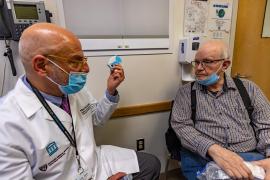Discrimination, Stigma Against MSM Hindering HIV/AIDS Programs in Senegal, Globe and Mail reports
The Globe and Mail on Tuesday examined how "state-sponsored" discrimination and stigma against men who have sex in men in Senegal has "shattered" HIV/AIDS programs aimed at the high-risk group. According to studies conducted by researchers at a university in the capital of Dakar in conjunction with local MSM , about 20% of Senegalese MSM are HIV-positive, compared with 0.7% of the general population. In addition, about 80% of MSM in the country have female partners.
Senegal's National Council for the Fight Against AIDS in 2002 "quietly" began to fund HIV prevention outreach for MSM, and it formally included the group in the national strategy against HIV/AIDS a few years ago, the Globe and Mail reports. However, in March -- when the country hosted the summit of the Organization of the Islamic Conference -- Senegalese President Abdoulaye Wade launched a campaign against attendees of a gay wedding, which included the founder of the first MSM organization established in the country who goes by the pseudonym Ceri, the Globe and Mail reports.
According to Ceri, "Some people fled the country, and some went into hiding" during the government's campaign. He added, "For reasons of cultural or religious or community sensibilities, [people in Senegal] may not want to talk about [MSM], but it's here" and the country cannot effectively fight the disease without acknowledging the community. Chiekh Niang of the Cheikh Anta Diop University said that the "government wanted to present an ultra-Muslim image of Senegal" to leaders attending the conference and that "they found a group to crush." Niang said, "Everyone -- governments, even AIDS researchers -- would say, 'MSM in Africa, it doesn't exist, and where it does exist, it's a Western import, it is not indigenous and not a real source of HIV transmission.'" He added, "It's homophobia: The strongest way of marginalizing a group is to say it does not exist, and even the researchers are not immune."
Ndella Diakhate, a senior executive of the country's national AIDS council, said MSM are "our people and they have the right to ... be protected from HIV." She added, "They have to be protected, for themselves and because they can be a route of transmission to the rest of [the] population." She noted that the events of the past few months are regrettable but that they likely will pass and that work will resume "without enormous consequences." Ceri said, "I don't see [the situation] improving because after all the work we have done, there is more homophobia than ever." He added that Senegalese society "will perhaps accept for [MSM] to fight HIV, but never accept for [MSM] to fight for [MSM's] human rights, or even recognize" MSM (Nolen, Globe and Mail, 6/3).






